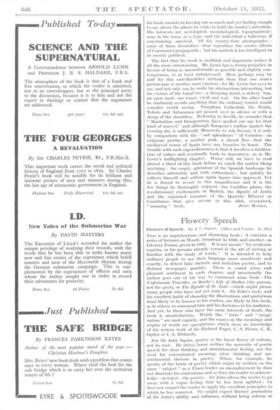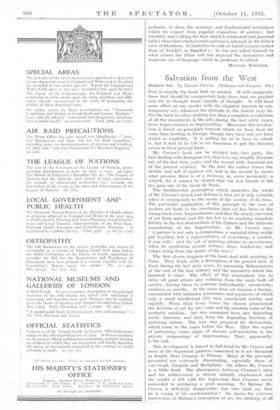Flowery Speech
Flowers of Speech. By J. C. Squire. (Allen and Unwin. 4s. 6d.) Tins is an unpretentious and disarming book : it contains a series of lectures on Words, broadcast in 1930, and another, on Literary Forms, given in 1981. It is not meant " for academic experts, or for persons already versed in the art of writing or familiar with the study of words." It is intended to help ordinary people to use their language more sensitively and exactly, to detect false rhetoric and imitation poetry, and to distrust newspaper pundits. There is sound sense and pleasant sentiment in each chapter, and occasionally the author goes out of his way to commend some book—The Unfortunate Traveller, or Burdy's Life of Skelton (the parson, not the poet), or The Epistle of St. Jude—which might please many people who have not yet read it. Sir John's style, and his excellent habit of choosing the illustrations and quotations most likely to be known to his readers, are likely in this book, as in others, to commend him and his doctrines to his audience. And yet, to those who have the same interests at heart, the book is unsatisfactory. Words like " form " and " imagi- nation" are used. vaguely, and the essays on the meanings and origins of words are speculations which show no knowledge of the serious work of Sir Richard Paget, C. S. Pierce, C. K. Ogden or I. A. Richards.
For Sir John Squire, poetry is the finest flower of culture, not its root. He drives home neither the necessity of poetic speech for clear thinking and unsentimental feeling, nor the need for concentrated meaning, clear thinking and un- sentimental rhetoric in poetry. When, for example, he speaks of the kinds of poetry which might be written on the same " subject " as a Times leader on unemployment he does not illustrate his contentions and so force his reader to acknow- ledgeor reject—the poetry. Sir John allows the reader to go away with a vague feeling that he has been uplifted ; 1:e does not compel the reader to apply the excellent principles to which he has assented. We might expect literary journalists of.,Sir John's .ability and influence, without being solemn or
pedantic, to show the accuracy and fundamental seriousness which we expect from popular expositors of science ; but triviality and a liking for that which is whimsical and personal rather than that which is exact and true is inherent in Sir John's view of literature. It leads him to talk of Lamb's essays rather than of Arnold's or Bagehot's :.he has not asked himself to what extent the Elian cult has fostered the insensitive and imprecise use of language which he professes to attack.
MICHAEL ROBERTS.































































 Previous page
Previous page